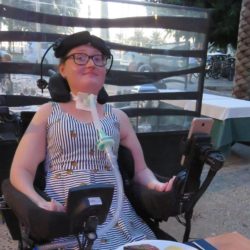Breaking the silence on women’s experiences of incontinence



Dr Dani Barrington, Lecturer in Water, Sanitation and Health, School of Civil Engineering. Follow Dani on Twitter: @Dani_Barrington
Dr Lena Jaspersen, University Academic Fellow, Management Division, Leeds University Business School.
Isobel Sale, Undergraduate Student, Bachelor of Arts (French and Linguistics)
Urinary incontinence (UI) disproportionally affects women. It is estimated that about one in three women experience the involuntary leakage of urine at some point in their life. Little is known about the experiences, needs and coping strategies of women, especially those who are not hospitalised or in care. Leakage can evoke feelings of embarrassment and shame.
We are a team of early-career researchers developing an inter-disciplinary research agenda to address UI in women. In October 2018 we facilitated three agenda-setting workshops; one with women who experience UI and two with stakeholders working in this field, including nurses, midwives, physiotherapists, activists, yoga instructors and researchers.
The workshops began with a short talk about the emerging research agenda. At two of the workshops, Isobel then presented her analysis of how women discuss UI on the online forum “mumsnet”. Her analysis showed how experiences of UI can fill women with misery and despair, and how persistent stigma and the silence surrounding UI can make it difficult for women to seek help. However, Isobel also highlighted expressions of positive emotions such as relief, compassion and encouragement, which could be found in most threads she analysed. Her emergent findings suggest that online forums can develop into virtual communities where anonymous users create bonds of mutual respect and understanding, even though they may only have two things in common ‒ the experience of urinary incontinence and of being a mother.
The presentation was followed by an open discussion and an exercise where all participants were asked to note down the challenges and opportunities associated with their experience and understanding of UI, which were then grouped according to their feasibility and potential for impact.
Challenges identified
- Overcoming stigma: The silence and embarrassment surrounding UI does not only prevent women from seeking help, but also healthcare practitioners from offering it to them.
- Social incontinence: Several women reported how they organise their daily lives around routes determined by the availability of (public) toilets.
- Inadequate products: Many women associated the size, shape and colour of typical continence pads with negative sensations surrounding disability, old age and death, from which they would prefer to distance themselves.
- Purchase and storage of products: Regularly purchasing continence products is an expensive exercise. The quality of low-cost products provided by the NHS is poor, the pads are delivered in bulk (a delivery can take up a spare room) and in order to cut costs, healthcare professionals are instructed to only provide such products if no other solutions are available, and with a cap on the amount of product provided per day.
- Indignity: Two workshop participants gave sobering accounts of how they felt that UI was dominating their lives in soul-destroying ways. Many participants reported that the medical procedures and assessments they experienced were deeply humiliating.
- Pelvic floor exercises: Two healthcare practitioners suggested that the majority of women who undertake pelvic floor exercises get them wrong. This may have something to do with the language in which instructions are provided, but also with women lacking a more detailed understanding of their own physiology.
- Information access: There is a lack of available information to evaluate the merits of different treatment options. Because UI can have so many underlying causes, and manifests in different ways, even for healthcare professionals it can be difficult to assess the relative benefit of different treatments.
Opportunities
- Communication: Social norms have to change in order to allow for more meaningful exchanges around experiences of UI.
- Information access: There were suggestions that research into causes, prevention and treatments may be already available - but not accessible. Many participants identified opportunities for improvements relating to information access and the provision of advice and guidance.
- Interventions: Participants suggested that guidance on UI and pelvic floor exercises be incorporated into existing antenatal care packages. Other ideas related to interventions enhancing the understanding of UI and related issues among the providers of frontline services, in particular midwives and GPs, and training in how to address the issue in a more engaging and sensitive manner.
Moving forward
Many findings from the workshop testify to persistent barriers preventing us from having a more open discourse on UI. The findings highlight the importance of overcoming these barriers and breaking the silence surrounding UI. They also indicate a need to increase awareness, expert knowledge and empathic understanding in order to improve the lives of those affected by UI. More research is needed into how experiences of UI can be communicated in ways that are both meaningful and empowering. It appears that women can overcome the stigma of UI by sharing experiences and “trouble telling”, and that when they discuss UI they seek compassion and companionship as much as competent advice.
It also needs to be acknowledged that most workshop participants reported a lack of trusted relationships among stakeholders. Many women experiencing UI deem it unfair that providers of medical devices profit from their misery. Similarly, they also reported difficult relationships with healthcare practitioners. The relationships surrounding UI need to be better understood in order to develop an agenda which could inform better products and treatments.
Our findings around language and communication, stakeholder relations, and information and data access in particular call for more in-depth and inter-disciplinary research. We are in the process of developing a research strategy to investigate these three aspects, starting with a project that examines more in detail how women communicate about UI using online forums.
We are incredibly grateful to the participants who took part in our workshops, and everyone who supported us in this first phase of the research. Thank you for reminding us that in order to break a silence one first needs to listen. We are always keen to hear from you and from others who wish to join us in our ambition to enable collaborative research and innovation for new solutions to urinary incontinence. Please do not hesitate to get in touch if you wish to join us on our journey.
